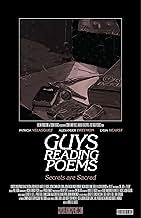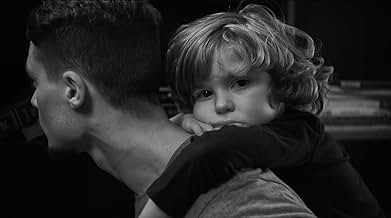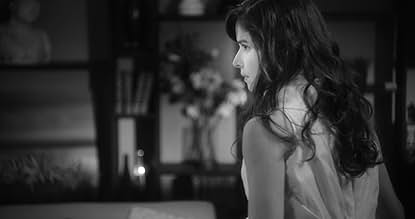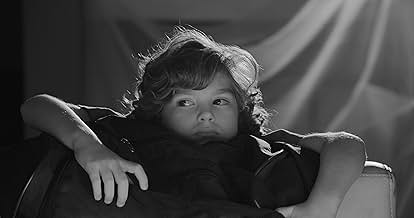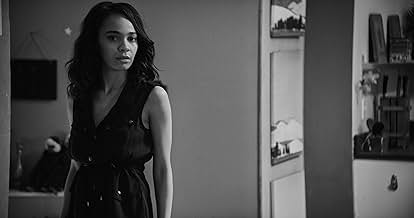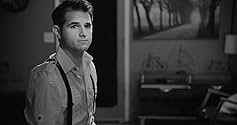Adicionar um enredo no seu idiomaA resourceful boy creatively uses poetry to survive when his mother, a disturbed avant garde painter, locks him in a puppet box and builds an art installation around his imprisonment.A resourceful boy creatively uses poetry to survive when his mother, a disturbed avant garde painter, locks him in a puppet box and builds an art installation around his imprisonment.A resourceful boy creatively uses poetry to survive when his mother, a disturbed avant garde painter, locks him in a puppet box and builds an art installation around his imprisonment.
- Direção
- Roteiristas
- Artistas
- Prêmios
- 3 vitórias e 1 indicação no total
Chris Crema
- Young Man
- (as Christopher Crema)
Adrian Quiñonez
- Actor In Underwear
- (as Adrian Quinonez)
- Direção
- Roteiristas
- Elenco e equipe completos
- Produção, bilheteria e muito mais no IMDbPro
Avaliações em destaque
I watched "Guys Reading Poems" last week during its first screening in LA. I was moved by how beautifully poetry and action were combined, resulting in such an honest and careful blending. It is an exceptional film that combines the romanticism of a past era with the issues that a modern human being has to face while growing up and as an adult. The performances were very honest and deep. For me, the best moment in the film was when the director, Hunter Lee Hughes, was reciting his own poem. We were wondering who wrote this modern masterpiece and found out it was him after the screening ended! From the audience's reaction, I realized I wasn't the only one who related to the story and its symbolic parallel universe. That's what a true piece of art does; it speaks to people's hearts through multiple paths. "Guys Reading Poems" is one of the best samples that the American film industry has to display. Watch it to get inspired and help it travel around the world so that more people can enjoy it!
Guys Reading Poems is a cinematic gem-a film that intertwines spoken poetry, a black-and-white backdrop, breathless imagery, a compelling storyline and a talented set of actors. It is the sort of film that you must savor with several viewings to grasp the full extent of Hughes' mastery in innovative storytelling. It will leave you wondering, feeling, imagining-all things I crave in a cinematic experience. Watch this film and be transported to someplace profound. At its heart, it is a simple, beautiful story echoed through poetry and the imagination of human resilience. The world needs more of these sort of inspired healing narratives. The world needs more films from Hunter Lee Hughes!
10texas-32
A truly unforgettable and unique film. From the cinematography and score to the pitch perfect ensemble casting and performances, the experience is one to be treasured and remembered. Hunter Hughes, who wrote, directed and also starred in the film, took a gamble and it paid off handsomely, and I expect it will continue to be rewarded during this season's festival circuit. The perfect use of poetry to meld with the scenes was original and engrossing as well. The story deals with contemporary issues including a dysfunctional family as well as child abuse, yet it shows the tragedy which it leads to without being tacky or cheap.It really is a film that sticks with you, and I look forward to seeing Hunter's future endeavors.
1. Is life merely a stage? as Shakespeare has posited, and later Oscar Wilde: "The world is a stage, but the play is badly cast." This film, though well cast, investigates the performative nature of our lives; if life is a stage, can we hide in it? Can we escape into this stage and allow it to become our coffin? The poetry-as-dialogue in this film lends itself to the viewing of life as performative, as expression of imagination and mind, as projective creation. What is real and what is merely our story? The film uses a performative form to examine (in pure meta fashion) what is the nature of story itself, and how do we act as players in the stage of life, in the stage of our generative minds? What stories do we tell ourselves to survive, and are they representative of our actual lives, or are they a dream?
2. The conceptual nature of art, of expression, can become a god in itself. For disdainfully rejecting all lovers, Narcissus, a beautiful youth, was condemned by the Greek gods to fall in love with his own reflection; having pined for this reflection, he withered away until all that was left was a narcissus flower. Recently some conceptual poets appropriated specific victims of violence in America for their art, reading autopsy reports as performance (perhaps going too far), and they were shunned by the poetry and arts community for being insensitive and inhuman, as if their hearts had withered away. These questions of the boundaries of where art can come from set the subtext for this film.
3. It has been said that all stories are either about love (romantic, familiar, community), death (literal, metaphorical), or god (the big philosophical questions: who are we? what is this? why are we here?). Guys Reading Poems hits on all three: what is the nature of love, how does death affect us, and what does it all mean? The film gives no clear answers, as much as it opens the door for inquiry. Milan Kundera says that the novel is meant, "to face not a single absolute truth but a welter of contradictory truths," as an investigation into the wisdom of uncertainty, an interrogation of human truth, which then becomes, "a place where the imagination can explode as in a dream." Guys Reading Poems, then, should be approached as film-as-literature, in that it functions novelistically in its complication of moral position, and expands with multiplicity, in refractory narrative, finding verisimilitude in the articulation of breaking free.
4. In the current world there is an explosion of pathology as diagnosis. What we now call bipolar disorder or schizophrenia was once named artist, poet, or shaman. Our culture leaves little room for the latter, though, and without proper support, the creative turns violent. An artist might need the spark of uncertainty to create, but where is the line? When does someone need treatment for mental health? How do we separate out an artistic temperament from a destructive imbalance? When should someone step in? The film apprehends these questions and gives us just enough, the pieces collapsing together, the knot untying itself in denouement, and we are left with a fine balance of questions and answers, so that Guys Reading Poems both satisfies and lingers, like a great poem cycling through our minds, an old reel of black-and-white film continuing to spin, opening a space to come back to, to investigate.
5. Poetry provides refuge; rather than despair, a boy rises into language, verse; the world not transcended, but emancipated into consciousness; we take this journey, hear the liberating voices, see the eye of a young mind transforming suffering into art, which seems to be the aim of this film, as much of artistic creation can be, so that we can find our own process, and though the film does not offer redemption, per se, the throughline takes us out of the conflict. The mythological components land, or are rooted in this reality, in psychology, perhaps, and thus the poetic journey into the mystical ends with coming back to the world, to the characters, and to ourselves.
2. The conceptual nature of art, of expression, can become a god in itself. For disdainfully rejecting all lovers, Narcissus, a beautiful youth, was condemned by the Greek gods to fall in love with his own reflection; having pined for this reflection, he withered away until all that was left was a narcissus flower. Recently some conceptual poets appropriated specific victims of violence in America for their art, reading autopsy reports as performance (perhaps going too far), and they were shunned by the poetry and arts community for being insensitive and inhuman, as if their hearts had withered away. These questions of the boundaries of where art can come from set the subtext for this film.
3. It has been said that all stories are either about love (romantic, familiar, community), death (literal, metaphorical), or god (the big philosophical questions: who are we? what is this? why are we here?). Guys Reading Poems hits on all three: what is the nature of love, how does death affect us, and what does it all mean? The film gives no clear answers, as much as it opens the door for inquiry. Milan Kundera says that the novel is meant, "to face not a single absolute truth but a welter of contradictory truths," as an investigation into the wisdom of uncertainty, an interrogation of human truth, which then becomes, "a place where the imagination can explode as in a dream." Guys Reading Poems, then, should be approached as film-as-literature, in that it functions novelistically in its complication of moral position, and expands with multiplicity, in refractory narrative, finding verisimilitude in the articulation of breaking free.
4. In the current world there is an explosion of pathology as diagnosis. What we now call bipolar disorder or schizophrenia was once named artist, poet, or shaman. Our culture leaves little room for the latter, though, and without proper support, the creative turns violent. An artist might need the spark of uncertainty to create, but where is the line? When does someone need treatment for mental health? How do we separate out an artistic temperament from a destructive imbalance? When should someone step in? The film apprehends these questions and gives us just enough, the pieces collapsing together, the knot untying itself in denouement, and we are left with a fine balance of questions and answers, so that Guys Reading Poems both satisfies and lingers, like a great poem cycling through our minds, an old reel of black-and-white film continuing to spin, opening a space to come back to, to investigate.
5. Poetry provides refuge; rather than despair, a boy rises into language, verse; the world not transcended, but emancipated into consciousness; we take this journey, hear the liberating voices, see the eye of a young mind transforming suffering into art, which seems to be the aim of this film, as much of artistic creation can be, so that we can find our own process, and though the film does not offer redemption, per se, the throughline takes us out of the conflict. The mythological components land, or are rooted in this reality, in psychology, perhaps, and thus the poetic journey into the mystical ends with coming back to the world, to the characters, and to ourselves.
I volunteered at th ine Palm Beach International Film Festival in 2016 and I had the privilege of watching this movie as well as meeting the cast and the director I cried through pretty much the entire film beautiful meaningful deep symbolic it touch my heart at touch my soul I felt so validated and recognized the imagery is so powerful and beautiful and the men in this film are beautiful frames and beautiful pedestals for the story, thank you, I love you dearly!
Principais escolhas
Faça login para avaliar e ver a lista de recomendações personalizadas
- How long is Guys Reading Poems?Fornecido pela Alexa
Detalhes
- Data de lançamento
- País de origem
- Centrais de atendimento oficiais
- Idioma
- Locações de filme
- Los Angeles, Califórnia, EUA(Secret Society Lair)
- Empresas de produção
- Consulte mais créditos da empresa na IMDbPro
- Tempo de duração1 hora 38 minutos
- Cor
Contribua para esta página
Sugerir uma alteração ou adicionar conteúdo ausente


